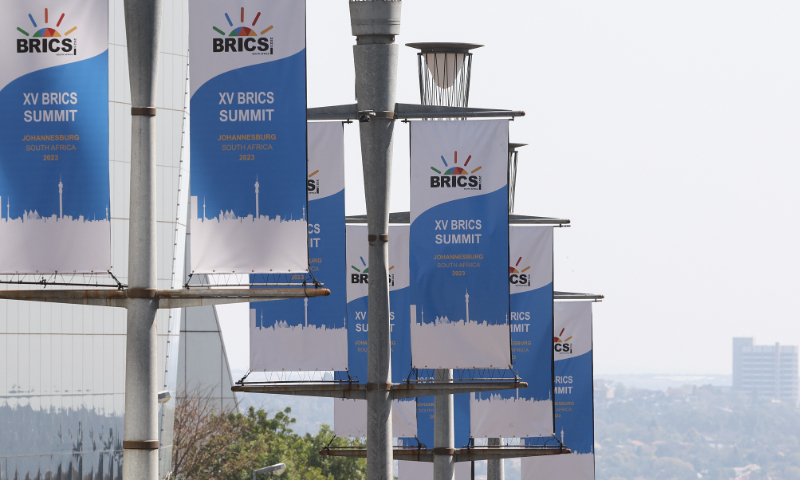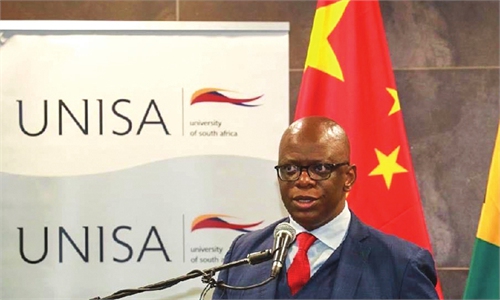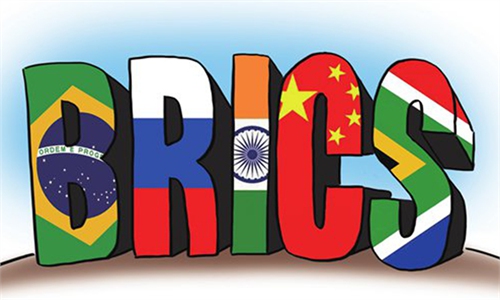US and Western countries could have met the 'BRICS' halfway: Global Times editorial

Banners are seen to promote the 15th BRICS Summit, which is to take place in Johannesburg, South Africa from August 22 to 24. Photo: VCG
The 15th BRICS Summit will be held in Johannesburg, South Africa from August 22 to 24. This marks the first in-person summit of the BRICS nations since the outbreak of the COVID-19 pandemic. South Africa, as the host country, has dedicated significant effort to this event. Over 60 global leaders and political heavyweights have been invited to attend. This summit is not only the largest in scale since the establishment of the BRICS cooperation mechanism, but also the largest gathering of its kind in the "Global South" in recent years. This reflects the increasing expectations being placed on the BRICS cooperation mechanism by more and more countries.
The theme of this summit is "BRICS and Africa: Partnership for Mutually Accelerated Growth, Sustainable Development and Inclusive Multilateralism." This theme itself adequately explains the reason for the wide attendance at the BRICS summit: The more uncertain the international environment becomes, the stronger the appeal and centripetal force of concepts such as openness, inclusivity, cooperation, and win-win.
It's reported that more than 40 countries have expressed desire to join the BRICS mechanism, and the issue of expansion is one of the topics that will get most attention at this year's South Africa BRICS summit. The BRICS mechanism is demonstrating a vigorous trend of growth and strengthening. Leaving aside other matters, this has greatly exceeded the expectations of Western countries and the US. Among the many emerging international developments that have been misjudged by the US and the West due to arrogance and biases, the BRICS cooperation mechanism is one of the most representative. Even today, this misperception continues.
Regarding this BRICS summit, the reporting from Western media has two major characteristics. First, it exaggerates the internal "divergences" within the BRICS mechanism, such as hyping up the China-India discord. South Africa's Minister of International Relations and Cooperation Naledi Pandor rebuked some media outlets for fabricating rumors which are "baseless attempts to undermine the event." Second, it distorts the interpretation of the BRICS mechanism's stance and nature, bringing the "China threat theory" that they have been propagating into the context of BRICS countries, attempting to portray the BRICS mechanism as a geopolitical rival to the Group of Seven (G7).
It is obvious that the attention given by the US and the West to the BRICS mechanism has been increasing year by year. In this process, their attitude has gradually shifted from underestimation and badmouthing out of arrogance to vigilance and precaution out of prejudice. At the same time, their aggressiveness toward the BRICS mechanism has also been growing stronger. At the beginning of the establishment of the BRICS, the US and the West generally believed that it would not last long and did not consider the possibility of the group's development and growth. However, after 17 years, as the BRICS is becoming even stronger, the US and the West have failed to reflect on why their judgments were wrong. Instead, they have shifted their misjudgment of the BRICS mechanism from one extreme to another.
The US and the West have both served as the backdrop and external environment for the birth of the BRICS mechanism, and have consistently acted as a mirror for the BRICS mechanism. The reason why the BRICS mechanism has such great appeal and attraction is, on the one hand, because the mechanism itself has developed well and has adapted to and satisfied the needs and calls of the times. On the other hand, it also reflects the general disappointment of many developing countries with the global governance system dominated and interfered by the US and the West. As China has repeatedly emphasized, "the traditional global governing system has become dysfunctional, deficient and missing in action, and the international community urgently expects the BRICS mechanism to strengthen unity and cooperation."
An article in American magazine The Nation on August 17 claimed that the expansion of the BRICS agenda indicates a hunger for countering the serious shortcomings of the US-led global order. It pointed out that the multiple failures of the US-led world order to substantially support two core requirements of Global South states - economic development and safeguarding sovereignty - are creating a demand for alternative structures for ordering the world. The BRICS and the Shanghai Cooperation Organization (SCO) are two major responses to these failures.
It must be said that this article is relatively objective and touches on the key points. However, such voice appears to be alone in the Western world and has not resonated much, nor has it prompted Western governments to adjust and correct their foreign policies. Viewing the development of the BRICS mechanism from a confrontational perspective and considering it as a threat to Western hegemony is becoming increasingly popular in Western societies. An Indian diplomat bluntly pointed out, "this threat perception emanates out of a morbid fear of extinction."
"Anti-Westernism" has never been on the agenda of the BRICS. The establishment and development of the BRICS cooperation mechanism is proof of the awakening of independent consciousness and the strengthening of autonomy of non-Western countries. This is not about confronting the West or stealing the limelight from the West. For the interests of all humanity, the most ideal state should be that the efforts and explorations of the BRICS align with the adjustments and self-corrections of the West, forming a joint force to address global challenges. However, the problem now is that the West has been unable to overcome its arrogance and prejudice, and non-Western countries cannot wait for the West to awaken. Instead, they are taking action and making efforts through mechanisms such as the BRICS to pave a new path for the reform of the global governance system, hoping that Western countries can catch up soon.



